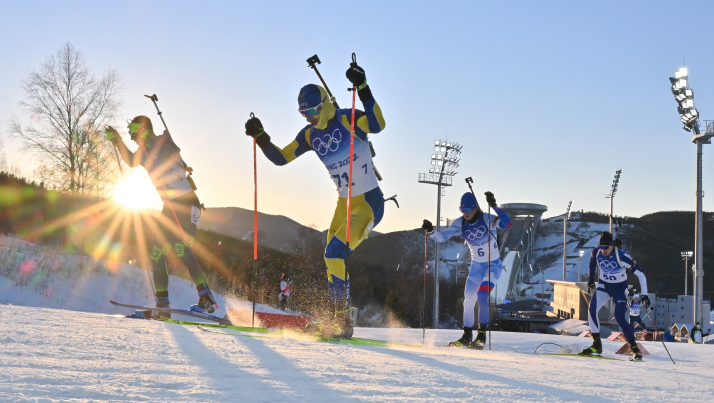
Gu Ailing, 18, became China's first female gold medalist on snow, performing a previously unseen trick in the freeski big air competition at the Olympic Winter Games Beijing 2022 on February 8.
"That was the best moment of my life," Gu said after the race. "The happiest moment, day, of my life. I just cannot believe what just happened."
In freeski big air's Olympic debut, Gu stomped a double cork 1620 with a safety grab, a stunt she had never accomplished in previous competitions or training sessions, and thus secured China's third gold at the Games.
"It was breathtaking to see this level of performance... I can't imagine what must have gone through her head before doing it," said Thomas Bach, President of the International Olympic Committee (IOC), who witnessed the historic moment on site.
Gu, known as Eileen in the U.S., was born in San Francisco to a Chinese mother and American father. She has been coming out for Team China since 2019.
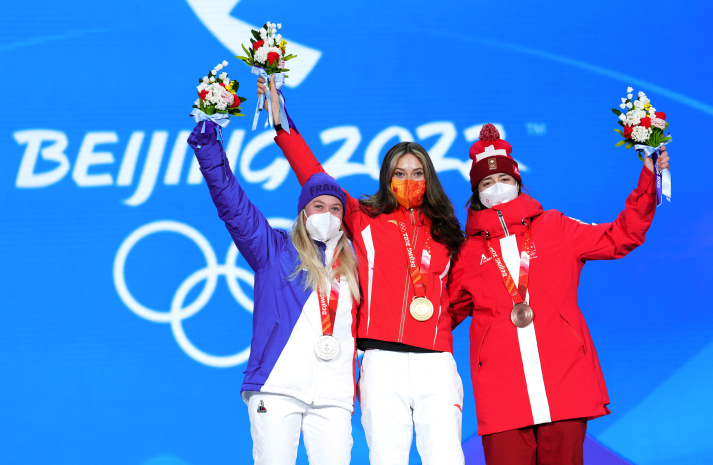
At the ensuing press conference, Gu expressed her gratitude to both China, the U.S. and both teams for their enduring support. "I feel like sports really are a way we can unite people; it doesn't have to be something that's related to nationality, and it's not something that can be used to divide people. We are all out here together pushing the human limit," she said.
"With the coronavirus pandemic still a reality for all of us and at a time when the world feels more divided than ever, Beijing 2022 will be an important moment to bring the world together in the spirit of peace, friendship and solidarity," Bach said, echoing the new Olympic motto of "Faster, Higher, Stronger—Together."
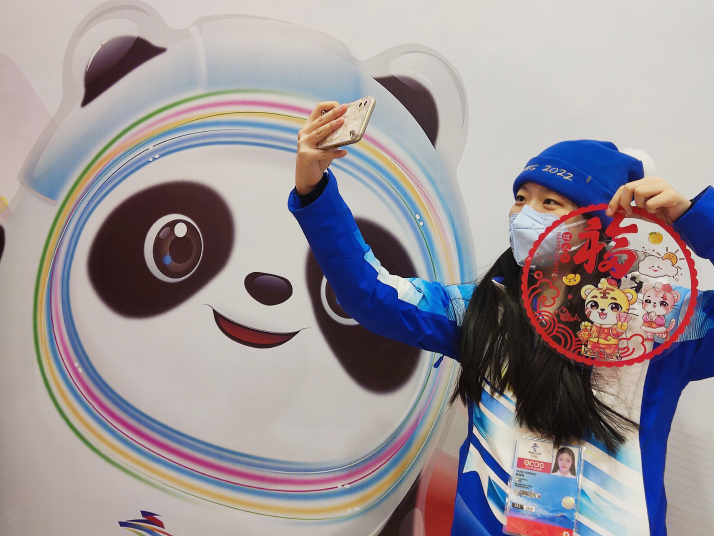
Prepare and present
Having already successfully hosted the Summer Olympics 14 years ago, Beijing becomes the first city to stage both summer and winter editions of the grandest of all global sporting events.
The Games kicked off on February 4, the fourth day of the first lunar month, right during the Spring Festival holiday, China's most important traditional celebration. They will last until February 20. The Paralympic Games will then run from March 4 to 13.
Although the pandemic resulted in the postponement, or even cancelation, of several test events, organizers managed to get everything ready for the Winter Games to be held on schedule. A range of strict COVID-19 countermeasures based on IOC and International Paralympic Committee policies are in place to ensure the safety of participants and locals.
All events take place within a closed-loop management system to reduce the risk of mass contagion. "We can see the closed loop is working. The Chinese people are safe, and the participants of the Games are safe," Bach said.
Organizers, staff and volunteers work to make life in the loop as convenient and fun as possible. The Olympic venues and their surroundings have achieved full 5G coverage, as have the high-speed rails leading into the area. Cocktail-shaking robots, smart beds and other equipment featuring advanced technologies are all available in the Olympic Village.
"The room, the venue and other facilities are great," Thai cross-country skier Karen Chanloung told Beijing Review.
With a green, inclusive, open, and clean approach in preparing for the Beijing 2022 Games, organizers have exerted many efforts to minimize the environmental impact, and bring about new development for the region and a better life for its people. This is also the first-ever Olympics whose venues are exclusively powered by clean energy from renewable sources and which use carbon dioxide to make ice.
A lot of thought went into giving athletes a memorable experience. For example, designers made several alterations during construction so that the S-shaped curve of the National Ski Jumping Center, located in the Zhangjiakou competition zone, gives athletes a view of the Great Wall as they prepare to takeoff.
Nicknamed Snow Ruyi, the venue features traditional Chinese culture as it resembles the shape of a ruyi, a traditional Chinese ornament symbolizing good luck.
"I love the tracks and the atmosphere here in Beijing," said Therese Johaug of Norway who claimed the first gold of the Beijing 2022 Games in the women's skiathlon at the National Cross-Country Skiing Center on February 5. The win also marked her first individual gold medal.
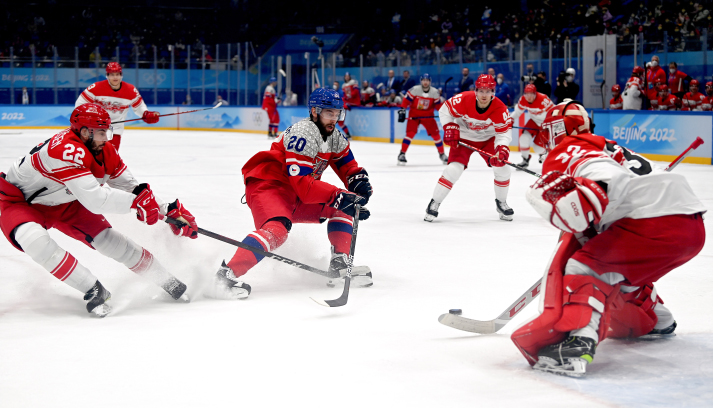
More than scores
Winning is the goal, but not the only one. For many of the roughly 2,900 athletes from 91 countries and regions gathered in Beijing, the Games are more about participating and sharing the joy of sports.
"It means a lot because this is the first-ever Winter Olympics for Saudi Arabia," Saudi flagbearer Fayik Abdi said. "We're really proud to be here and hopefully we can continue to be here in the future."
Spanish freestyle skier Thibault Magnin told Xinhua News Agency, "Seeing all the nations here together is an unbelievable experience, and we're going to enjoy it," after settling into what he described as the "incredible" Olympic Village.
While crossing the finish line after her 3,000m race on February 5, German speed skater Claudia Pechstein wore a smile on her face despite knowing she would finish 20th—and last.
"But I am happy and proud of what I've achieved. That makes me smile," the eight-time Olympian said.
Chinese skier Zhao Yang echoed Pechstein, as he finished at the bottom in the second qualification round for the men's freestyle skiing moguls event at Beijing 2022, and failed to qualify for the finals on February 5.
"My dream to compete at the Olympics has come true. That's all I can ask for. I tried my best," said Zhao, who made China's Olympic debut in the event.
"Chinese athletes have made great progress in the men's moguls, but still have a long way to go. I believe the team will become much stronger in future. I will keep training and look forward to the next Winter Olympics," Zhao added.
"To an ordinary Chinese spectator sitting at home in front of the television like me, the Games are never only about scores, but about the joys and tears during the competitions, and the persistent and dauntless athletic attitude. I empathize not only with the athletes from my own country, but with others as well," Winter Olympic enthusiast and retiree in Changchun, capital of Jilin Province in northeast China, Wang Gejun told Beijing Review.
China's 177 athletes will compete in 104 events across 15 disciplines in all seven sports, the country's largest-ever presence in a Winter Games. China had never competed in about one third of the 109 events currently unfolding at Beijing 2022 when the city was awarded the Games' hosting rights in July 2015.
In fact, the country is not a major winter sports player, except for being competitive in such events as short track speed skating and figure skating.
Four years ago, in Pyeongchang, Team China competed in 53 events across 12 disciplines, and took home one gold, six silvers and two bronzes, ranking 16th in the gold medal tally.
Chinese President Xi Jinping, who believes sport is an important means for improving people's health and meeting people's aspirations for a better life, envisaged early in the bidding stage that the Winter Olympics could help introduce winter sports to 300 million Chinese people.
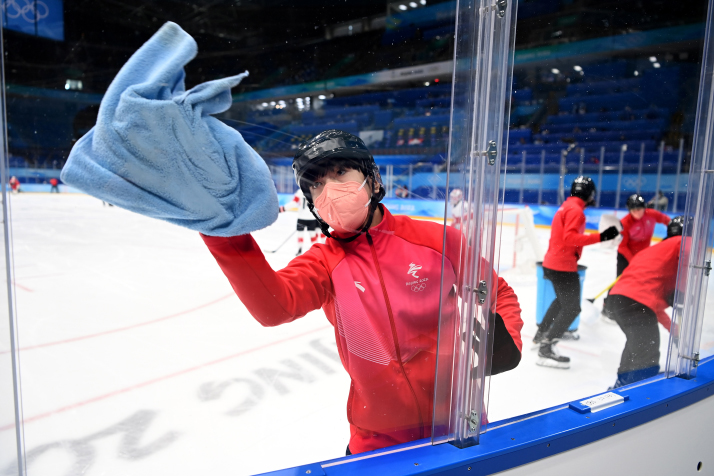
Staff deices the windows to ensure camera reporters can get a clear shot of the National Indoor Stadium in Beijing on February 4 (XINHUA)
A roar for more
"This Year of the Tiger is also an Olympic year. Both the Year of the Tiger and the Olympic year stand for ambition, courage, and strength," said Bach, referring to the Chinese zodiac calendar that assigns each year to one of 12 animals.
He said thanks to this ambition, China today is a winter sports country, with well over 300 million people practicing winter sports.
Over 346 million Chinese people have participated in winter sports activities since Beijing's successful bid for the 2022 Winter Olympics in 2015, according to statistics released by China's National Bureau of Statistics in January. Accounting for the biggest percentage are those aged between 18 and 30, with 82 million people falling into this category, exceeding 37 percent of the total number.
Various means and measures make skiing more accessible to the public, with hundreds of new facilities constructed over the past several years. As of 2020, China featured 803 ski resorts, up from 568 in 2015. There are also 654 ice rinks across the country, an increase of more than 310 percent from 2015.
Thanks to hi-tech facilities such as artificial ice rinks that can be detached and moved, artificial intelligence skiing simulators and the dry-land roller ski training methods, winter sports have now reached the country's warmer southern provinces and have been added to the curricula of over 2,000 schools.
"This extraordinary achievement rings in a whole new era for global winter sports. It will raise participation to new levels, benefiting the Chinese people as well as winter sports enthusiasts worldwide," Bach said.
The Beijing 2022 Games may "change the scale of winter sports forever," he concluded.
(Print Edition Title: In Sync, Now and Forever)
Copyedited by Elsbeth van Paridon
Comments to luyan@cicgamericas.com